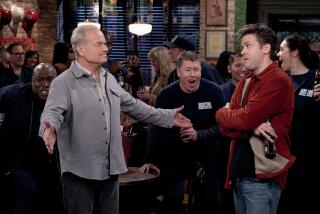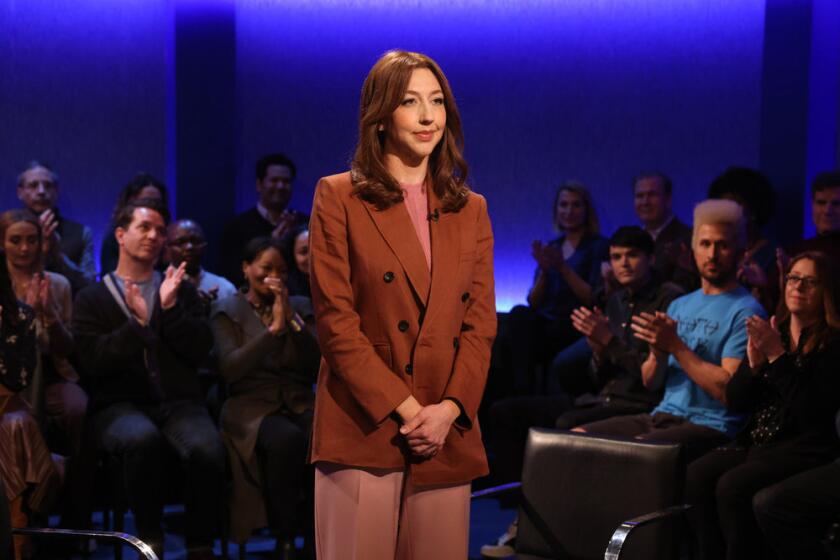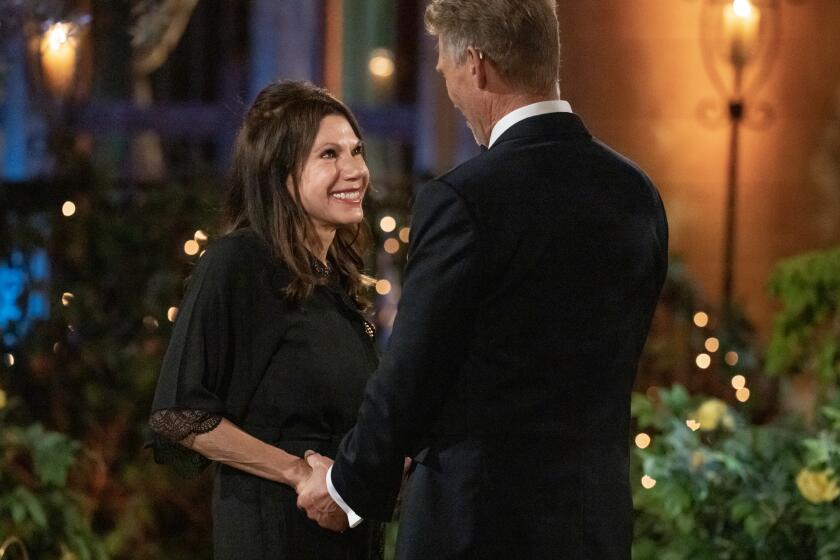Critic’s Pick: TV Picks: ‘Veep,’ ‘The Runner-Up,’ ‘Cucumber,’ ‘Banana’
“Veep” (HBO, Sundays); “The Runner-Up” (Esquire, Tuesdays). Julia Louis-Dreyfus returns for a fourth season in Armando Iannucci’s nonpartisan political satire, having won an Emmy for each of the preceding three. Although the title remains unchanged, Louis-Drefyus’ Selina Meyer is now improbably the president, the former president having resigned to care for his wife at the beginning of a primary campaign that Selina was already well on her way to losing. Like the U.K. series it’s kind of based on, Iannucci’s “The Thick of It,” “Veep” was originally about powerlessness within the orbit of power; it now becomes a disquisition on power in the hands of fools. Although Selina and her team are in the White House now, they are no less prone to misstep and overreach as they blunder and bumble and bluff their way along -- every other thing they do is to cover up the last. And yet they remain lucky. (Classic sitcom rules, and not foreign to politics as this country practices them.) As before, Louis-Dreyfus turns in a furious performance, rich with profanity, as a person terribly self-involved but not wholly unsympathetic. Delighted with herself and horrible to most everyone else, she’s a terrible leader but good at being the boss, in a Bravo kind of way; she somehow lets you see her point, buried in layers of calculation though it might be.
Here are some of the funny things people say in the first four episodes, which notably add Patton Oswalt to yet another cast and bring Diedrich Bader closer to the center of things: “If anyone can do this deal, I’m confident you or the guy we hired to replace you can”; “It would be the first brick in the wall of peace”; “It reminds me of an easier time, or a time whose problems I’ve suppressed”; “I just wanted to say a friendly hello in in an unfriendly way -- hello”; “It’s not that you’re unlikeable, it’s that there’s a perception that you’re unlikeable”; “You can absolutely do two contradictory things at once; for example, I love my mother but I had to put her in a home -- and it’s actually better for her if I don’t visit”; and from Selena, “I am most humbled to have played my small part in human history.” Filmed with a documentary swing but not a documentary framework, like the “The Larry Sanders Show” (where the walk-and-talk was really born, to digress, before moving on).
Second-season “American Idol” and something-season “Celebrity Apprentice” silver medalist Clay Aiken’s 2014 quixotic campaign for a North Carolina congressional seat is the subject of “The Runner-Up,” a locally colorful, four-part documentary from the Esquire Channel. (Spoiler alert from actual history and the title: After winning the primary against a better-heeled and experienced opponent, Aiken lost to Republican incumbent Renee Ellmers.) Like Selina Meyer, Aiken has a dedicated team, which is presented as characters, or rather the suggestion of characters, most memorably young communications director Tucker Middleton, who watched Aiken’s “Idol” as a 13-year-old. (“Tucker, you’re grinnin’ like a possum eating bumblebee,” someone tells her -- I think I heard that right.) But the focus is mostly on the candidate, an appealing if sometimes fretful sort -- his handlers call him “a challenge” -- who supports special-needs education, marriage rights and, like any sane person, a depolarized, depoliticized Washington, a local celebrity-hero and man of the little people “who will advocate for us and not for big business and special interests.” (Policy remains vague; it’s the process and personalities that matters here.) Still, the sharp elbows of politics leave Aiken conflicted: “I don’t know whether I would rather win or rather lose,” he says, getting ready to lose. “I’ve come in second before, I can do it again if I have to.”
“Cucumber” and “Banana” (Logo, Mondays). Before he regenerated “Doctor Who” a decade ago, Russell T. Davies created “Queer as Folk,” a groundbreaking series about gay life in Manchester, England (quickly American-remade by Showtime). He returns to that place and milieu in two new series that share characters and settings. “Cucumber” focuses on Henry Best (Vincent Franklin), a middle-aged insurance salesman in a middle-age crisis; he and his friends remember the good old, bad old days with affection and affectionate horror -- they’re old enough to have some perspective on their lives, but not necessarily, and young enough to not yet feel old, but not necessarily. It begins very much as a comedy, though -- Davies fans will not be surprised to learn -- an often troubling one. “Banana” which looks at the LGBT younger set -- living in a warmer social climate and for whom gayness is a factor but not an issue -- is constructed as a series of short stories, in the author’s own analogy, where “Cucumber” is a novel. Davies, 51, writes the older characters with the tenderness of experience and the younger ones with the tenderness with which experience regards innocence. The heart that made his version of Gallilfrey’s sentimental alien so successful -- some “Who” fans still want those Doctors back -- beats here as well; he’ll make you cry, if you let him, and you should let him. Here too the universe is a dangerous place -- Daleks! -- but also a good and wondrous one.
Robert Lloyd is hunkered down on Twitter @LATimesTVLloyd
More to Read
The complete guide to home viewing
Get Screen Gab for everything about the TV shows and streaming movies everyone’s talking about.
You may occasionally receive promotional content from the Los Angeles Times.







